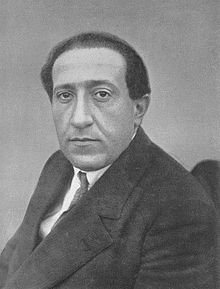József Pogány
| John Pepper | |
|---|---|

József Pogány (John Pepper) circa 1919
|
|
| Born |
József Schwarz November 8, 1886 Budapest, Austria-Hungary |
| Disappeared | July 29, 1937 (aged 50) Moscow, Soviet Union |
| Died | February 8, 1938 (aged 51) Moscow |
| Cause of death | execution in Great Purge |
| Residence | Budapest, Moscow, New York |
| Nationality | Hungarian |
| Other names | József Pogány, Joseph Pogány, Berger, Joseph Lang, John Rogers |
| Alma mater | University of Budapest |
| Occupation | Journalist, Political activist |
| Spouse(s) | Irén Czóbel Pogány |
| Parent(s) | Vilmos Schwartz, Hermina Weinberger |
John Pepper, also known as József Pogány and Joseph Pogany (born József Schwartz; November 8, 1886 – February 8, 1938), was a Hungarian-Jewish Communist politician, active in the radical movements of both Hungary and the United States. He later served as a functionary in the Communist International in Moscow, before being cashiered in 1929. Later an official in the Soviet government, Pepper ran afoul of the secret police and was executed during the Great Terror of 1937–38.
József Pogány was born József Schwartz in Budapest, Hungary, on November 8, 1886. He was the first of three children. His family were ethnic Jews: he took the Magyar "Pogány" to de-emphasize his Jewish origins. His father, Vilmos Schwarz, was a tradesman who became a minor civil servant; he also served Chevra Kadisa synagogue in Pest. His mother Hermina Weinberger was a hairdresser. He was not related to artist Willy Pogany, as was once claimed by Whittaker Chambers.
Pogány studied at the University of Budapest (1904-1908); he spent his last six months of studies in Berlin and Paris. He wrote his dissertation on János Arany.
He worked as a high school teacher and journalist in Hungary prior to the revolution of 1918–1919. He wrote for the official organ of the Hungarian Social Democratic Party, Népszava (People's Voice), and was a war correspondent during the years of World War I.
Despite lack of military credentials aside from war reportage, at the time of the collapse of the Austro-Hungarian empire in 1918, Pogány found himself as the leader of the Budapest Soldiers' Soviet. While Pogány dedicated himself to promotion of what one historian has called "the often impossible demands of the soldiers," he nonetheless remained for a time supportive of the policies of the left-wing government of Count Mihály Karolyi.
...
Wikipedia
